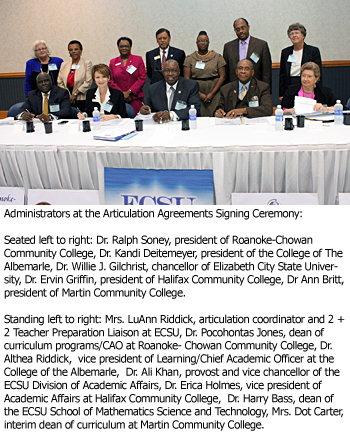ECSU and community college agreements ease transition for transfer students

Kesha Williams
October 10, 2011
Transferring from nearby community colleges to Elizabeth City State University has just gotten easier.
ECSU administrators recently met with administrators from four area community colleges to establish 12, new articulation agreements. The agreements will increase the number of students who ultimately realize their dream of earning a bachelor’s degree.
Under the agreements, up to 65 credit hours earned by students in a two-year associate in arts or associate in science program can be transferred to select degree programs at ECSU. Those ECSU program are pre-aviation science birth through kindergarten education pre- business administration/marketing computer engineering/industrial technology computer engineering technology/engineering technology, associate science, engineering with a minor in mechanical and automation associate in science, engineering technology, with a minor in computer and information technology pre-criminal justice pre-marine environmental science pre-middle grades education pre-pharmaceutical science, with a concentration in biotechnology pre-pharmaceutical science, with a concentration in clinical science.
LuAnn Riddick, 2+2 teacher preparation liaison and articulation coordinator at ECSU, says the agreements will assure community college students that they are on the right track to enter ECSU as a junior and to earn an undergraduate degree in a timely manner.
"In the past when these agreements weren’t on paper, community college students had questions about the courses that would transfer to a UNC university," Riddick said. "What is special about our new agreements is we have designed a specific curriculum guide per major — a blueprint of the exact courses they must complete at the community college."
The agreements also serve as blueprints for community colleges advisors to ensure that students stay on track for a specific major. Once the specified courses are completed under the community college’s two-year program, the student earns an associate degree. It also helps community colleges to meet their goals of awarding a specified number of degrees each year.
"The associate’s degree is an important achievement for the community college student — their first milestone toward a four-year degree," Riddick said. "The associate’s degree also makes those students eligible for the UNC scholarship, which can be used to cover tuition and fees during their junior and senior years at ECSU."
Riddick said state education statistics show that students who first earn an associate degree enter the university as mature students. They typically achieve higher grade-point averages in their community college courses in preparation for the transfer and the rigors of a four-year degree program. Once at a four-year institution, transfer students also have a higher degree completion success rate, she said. Many are nontraditional students who work and have family responsibilities. Their family’s economic stability is dependent upon their academic progress. Once they earn their bachelor’s degree, they are poised to secure jobs that will support their families.
ECSU administrators take great pride in the articulation agreements which will allow them to embrace these successful transfer students. The new agreements are with College of the Albemarle, Halifax Community College, Martin Community College and Roanoke-Chowan Community College.
Contact the vice president of curriculum and instruction at each of the four community colleges for more information. Also, contact Dr. Monette Williams, director of the ECSU Office of Admissions, (252) 335-3305, or LuAnn Riddick, 335-3815, for more information on transferring to ECSU.

